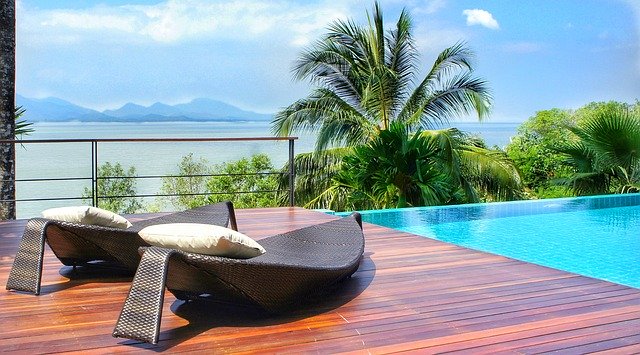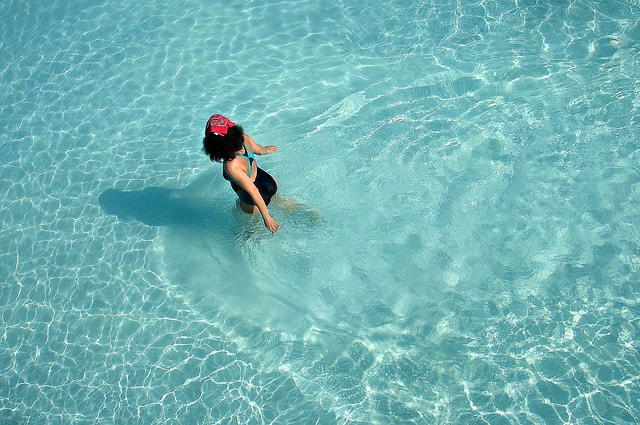Saltwater Pools - Wilmington, NC
What makes a salt chlorine generator?
A generator has two primary components which are the control board and the cell. As salt water from the pool moves through the cell metallic grids and electricity make a reaction converting the salt into bubbles of pure chlorine. When this pure chlorine exits the chlorinator it reacts with water and forms hypochlorous acid which keeps your pool sparkling clean!
Many pool service professionals have different opinions on what "chlorine" really means. Multiple chlorine variants can be added to water but after all the chemical reactions occur what is really cleaning your pool is hypochlorous acid, not the pure chlorine.
The chemistry involved to make these reactions can also make your head hurt so what you need to remember is that a saltwater pool uses a salt chlorine generator and salt to make hypochlorous acid. After pouring the appropriate salt in the water and mix it will go through two different chemical reactions resulting the in the chemical that will destroy dirt and kill algae and bacteria.
The first reaction is when the salt water moves through the salt chlorine generator. Through electrolysis the saltwater is converted into pure chlorine, sodium hydroxide, and hydrogen. The sodium hydroxide and hydrogen are absorbed into the pool in their current state.
The chlorine however reacts with the surrounding water molecules and is transformed into hypochlorous acid.. This acid is what kills algae and bacteria quickly and is the chemical being tested for when "chlorine levels" accessed.
What type of salt should I use in my saltwater pool?
Options that you have for salt to use in your pool include:
DO NOT use rock salt in your pool! It doesn't dissolve well and is not pure enough. If you are worried about slipping on ice or making ice cream you can buy rock salt but do not put this in your pool.
How much salt should I use?
Salt levels should be maintained between 3000 and 4000 ppm. For the exact amount, you can check what your specific cell is rated for as the range varies depending on brand and model of the salt chlorine generator. A brand new pool will require 40-50 pounds of salt per 2,000 gallons of water.
What is the cost of a salt chlorine generator?
Installing a salt chlorine generator will cost between $600 to $2500 dollars. While this is a substantial initial investment many customers find it worthwhile as they do not need to buy chlorine from a store.
A traditional chlorine pool will cost between $250-$300 per year to maintain, where as a salt water pool only cost between $50 to $100 for maintenance per year. You will have to consider replacing the generator cell every 3-7 years which will be between $700 - $900. After running the numbers you will find that a salt water pool will cost roughly the same as a traditional chlorine pool to maintain.
What are the pros and cons of a salt pool?
Pros:
What pool types will work with a salt water system?
Fiberglass pools are the best choice for use of a salt chlorine generator. Pools that have vinyl liners and polymer wall panels and also concrete pools with a tiled interior surface are also good candidates for use of a salt chlorine generator.
You do not want to use this system on pools that have a vinyl liner with metal wall panels. Corrosion will occur on the panels and any handrail or ladder anchor manufactured from galvanized steel. Saltwater can also be abrasive to the interior surface of plaster and concrete/gunite pools.
Next Steps
We know that this is a lot of information but if you have any further questions or would like a free estimate on what it would cost to add a saltwater pool to your home please reach out to us at 910-832-1055. One of our service providers will be in touch to schedule your free consultation.
A generator has two primary components which are the control board and the cell. As salt water from the pool moves through the cell metallic grids and electricity make a reaction converting the salt into bubbles of pure chlorine. When this pure chlorine exits the chlorinator it reacts with water and forms hypochlorous acid which keeps your pool sparkling clean!
Many pool service professionals have different opinions on what "chlorine" really means. Multiple chlorine variants can be added to water but after all the chemical reactions occur what is really cleaning your pool is hypochlorous acid, not the pure chlorine.
The chemistry involved to make these reactions can also make your head hurt so what you need to remember is that a saltwater pool uses a salt chlorine generator and salt to make hypochlorous acid. After pouring the appropriate salt in the water and mix it will go through two different chemical reactions resulting the in the chemical that will destroy dirt and kill algae and bacteria.
The first reaction is when the salt water moves through the salt chlorine generator. Through electrolysis the saltwater is converted into pure chlorine, sodium hydroxide, and hydrogen. The sodium hydroxide and hydrogen are absorbed into the pool in their current state.
The chlorine however reacts with the surrounding water molecules and is transformed into hypochlorous acid.. This acid is what kills algae and bacteria quickly and is the chemical being tested for when "chlorine levels" accessed.
What type of salt should I use in my saltwater pool?
Options that you have for salt to use in your pool include:
- Mined Salt
- Solar Salt
- Mechanically evaporated salt
DO NOT use rock salt in your pool! It doesn't dissolve well and is not pure enough. If you are worried about slipping on ice or making ice cream you can buy rock salt but do not put this in your pool.
How much salt should I use?
Salt levels should be maintained between 3000 and 4000 ppm. For the exact amount, you can check what your specific cell is rated for as the range varies depending on brand and model of the salt chlorine generator. A brand new pool will require 40-50 pounds of salt per 2,000 gallons of water.
What is the cost of a salt chlorine generator?
Installing a salt chlorine generator will cost between $600 to $2500 dollars. While this is a substantial initial investment many customers find it worthwhile as they do not need to buy chlorine from a store.
A traditional chlorine pool will cost between $250-$300 per year to maintain, where as a salt water pool only cost between $50 to $100 for maintenance per year. You will have to consider replacing the generator cell every 3-7 years which will be between $700 - $900. After running the numbers you will find that a salt water pool will cost roughly the same as a traditional chlorine pool to maintain.
What are the pros and cons of a salt pool?
Pros:
- Lower annual cost
- No chlorine smeel
- Gentle on skin and eyes
- Clear, Clean, Smooth Water
- Parts are more expensive
- Remembering to test the water is difficult
What pool types will work with a salt water system?
Fiberglass pools are the best choice for use of a salt chlorine generator. Pools that have vinyl liners and polymer wall panels and also concrete pools with a tiled interior surface are also good candidates for use of a salt chlorine generator.
You do not want to use this system on pools that have a vinyl liner with metal wall panels. Corrosion will occur on the panels and any handrail or ladder anchor manufactured from galvanized steel. Saltwater can also be abrasive to the interior surface of plaster and concrete/gunite pools.
Next Steps
We know that this is a lot of information but if you have any further questions or would like a free estimate on what it would cost to add a saltwater pool to your home please reach out to us at 910-832-1055. One of our service providers will be in touch to schedule your free consultation.

